vba [ʋá] vb. 1. (of liquids and powdery
mass) to spill as a result of heaving
motion; to overflow from the heaving
force: Amẹ ke ekpamaku vba kue
otọ ― “Water spilled onto the floor
from the basin.”; 2. to heave: Amẹ
gha vba yo vbarre vbe ekpamaku ―
“The water is heaving back and forth
in the basin.”
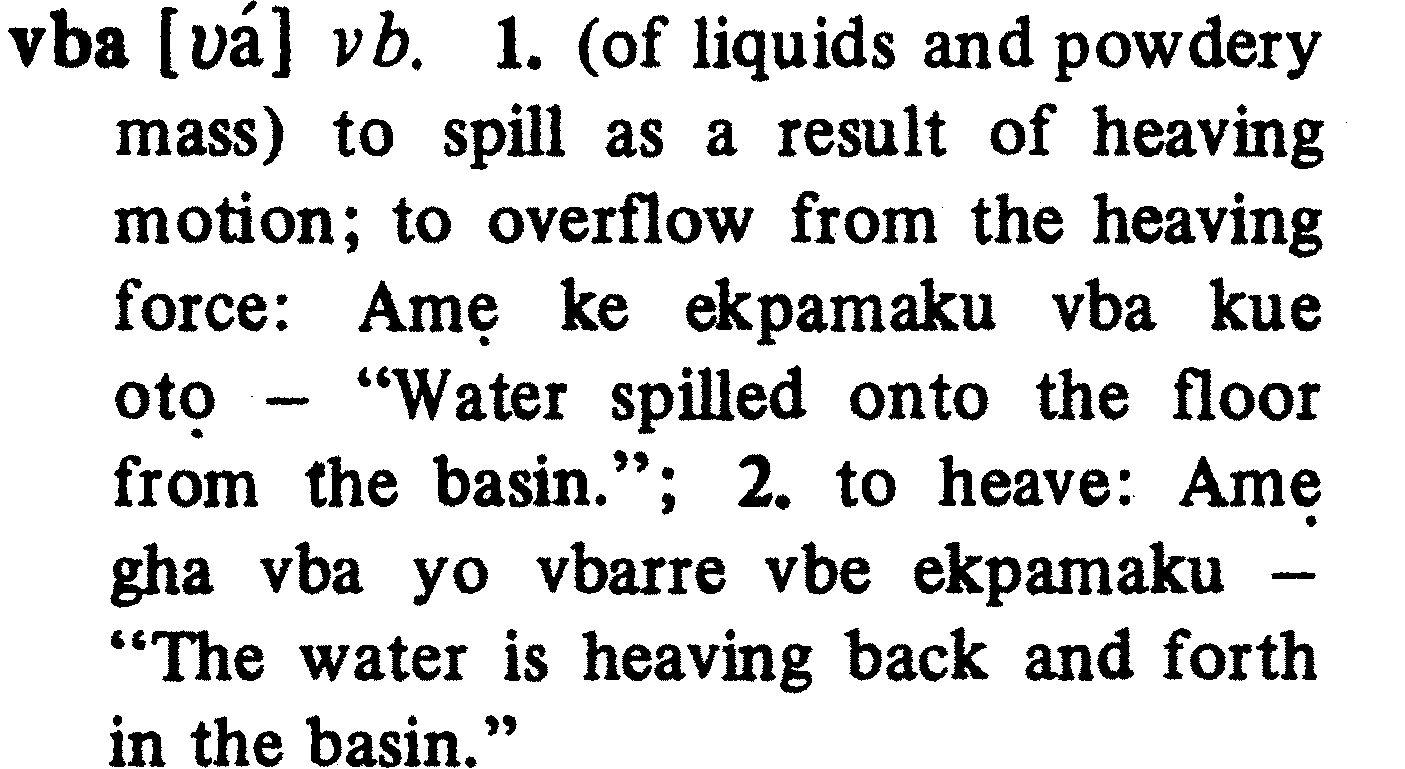
vbaa [ʋàá] vb. 1. to meet; to join
with; to catch up with: Ọ ya vbaa
ore vbe ugbo ― “He went to meet
him in the farm.”; 2. (idiomatic):
(usually in construction with “vbe
%%

owa”): to be a virgin: A vbaa ọre vbe
owa ― “She was met at home: She
was a virgin.”; 3. to affect (e.g. a
curse). Ihẹn ọnrẹn i vbaa mwẹn ―
“His curse will not affect me.”; 4. to
land on; to hit (as a target): Ugbe
vbaa ọre uhunmwun ― “A missile
hit her on the head.” (also vbaọ).
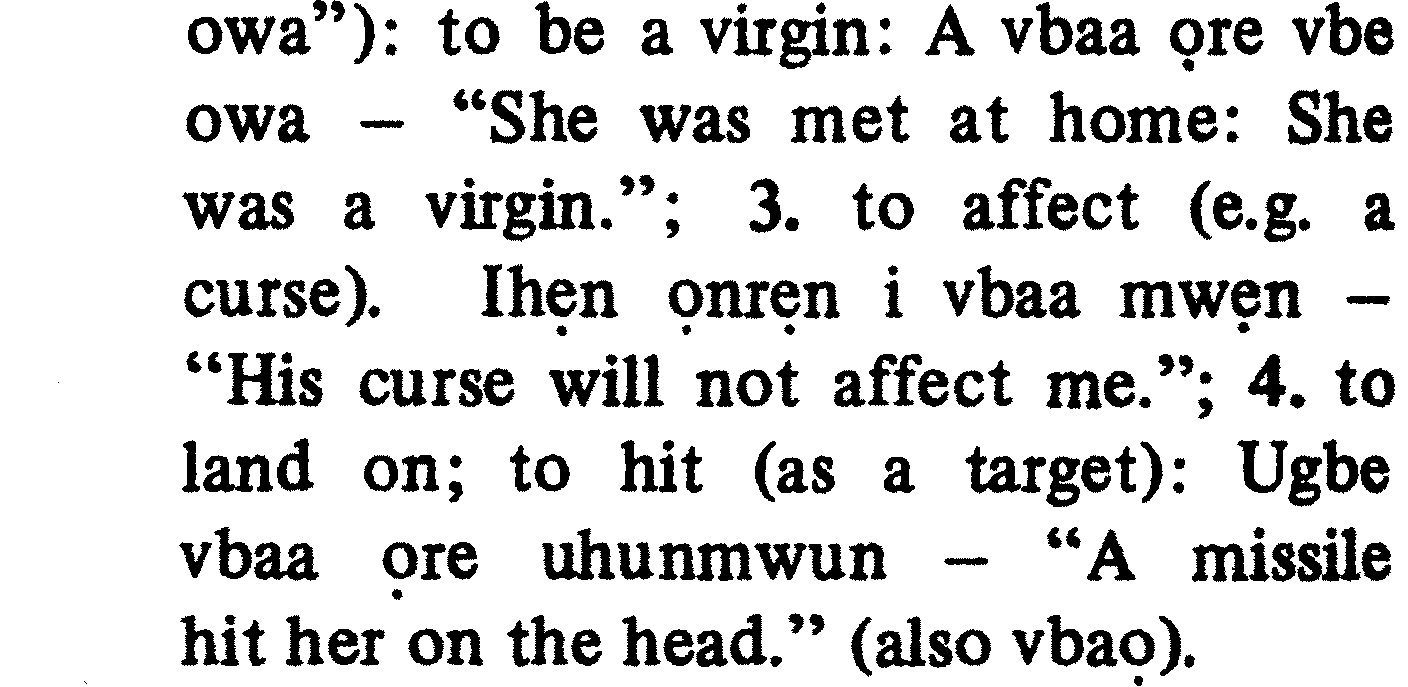
vbavba [ʋàʋá] n. an address term for
“father”, used mainly in prayers, or
in contexts when the person addressed
is very old, and extra deference is
intended: Dọmọ, vbavba! ― “Greet-
ings, old father!” (cf. evbavba).
$Page 159$
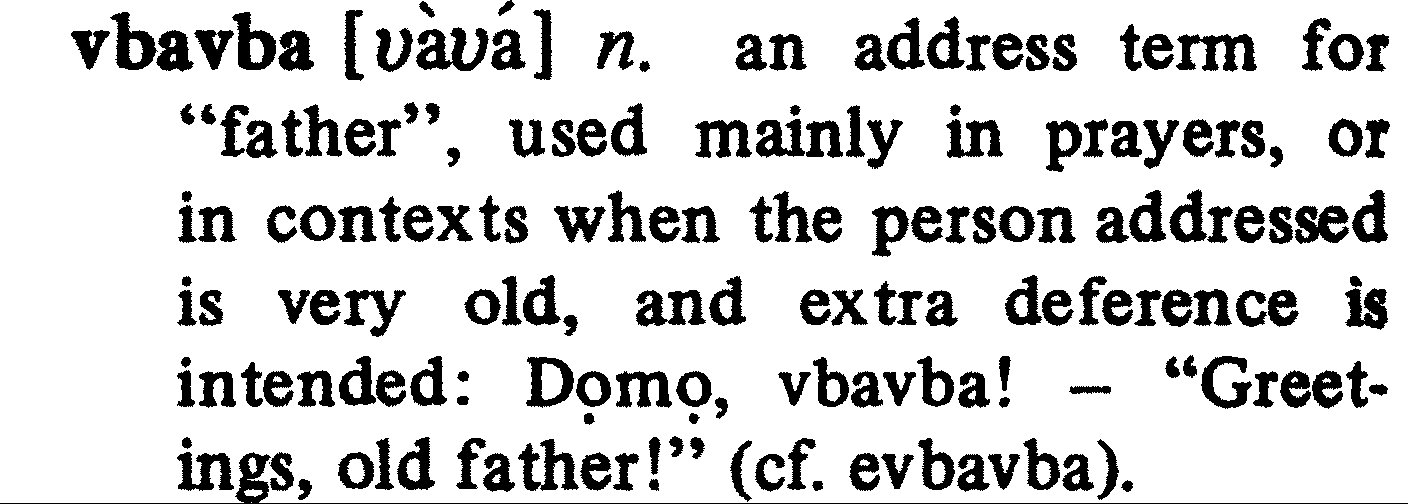
vbavbavba [ʋàʋàʋà] adv.; adj. describes
bulging eye-balls: aro vbavbavba.

vbe1 [ʋè] prep. in, at, on (depending
on the noun with which it occurs):
vbe odẹ ― “on the way”; vbe ọwa ―
“at home”; vbe owiẹ ― “in the
morning”, etc.

vbe2 [ʋè] inter.; pron. what?: vbe ọ
mu fua? ― “What he lost?”: What
did he lose? vbọzẹ (< vbe ― ọ― ze?)
“What-it-be responsible for?” What
is it that is responsible for . . . ?; why?
Vbọọkhin? (< vbe ― ọ ― khin?)
“What-it-be?”: What is it (that) . . . ;
why?: Vbọọkhin ne u na viẹ? “Why
are you crying?”
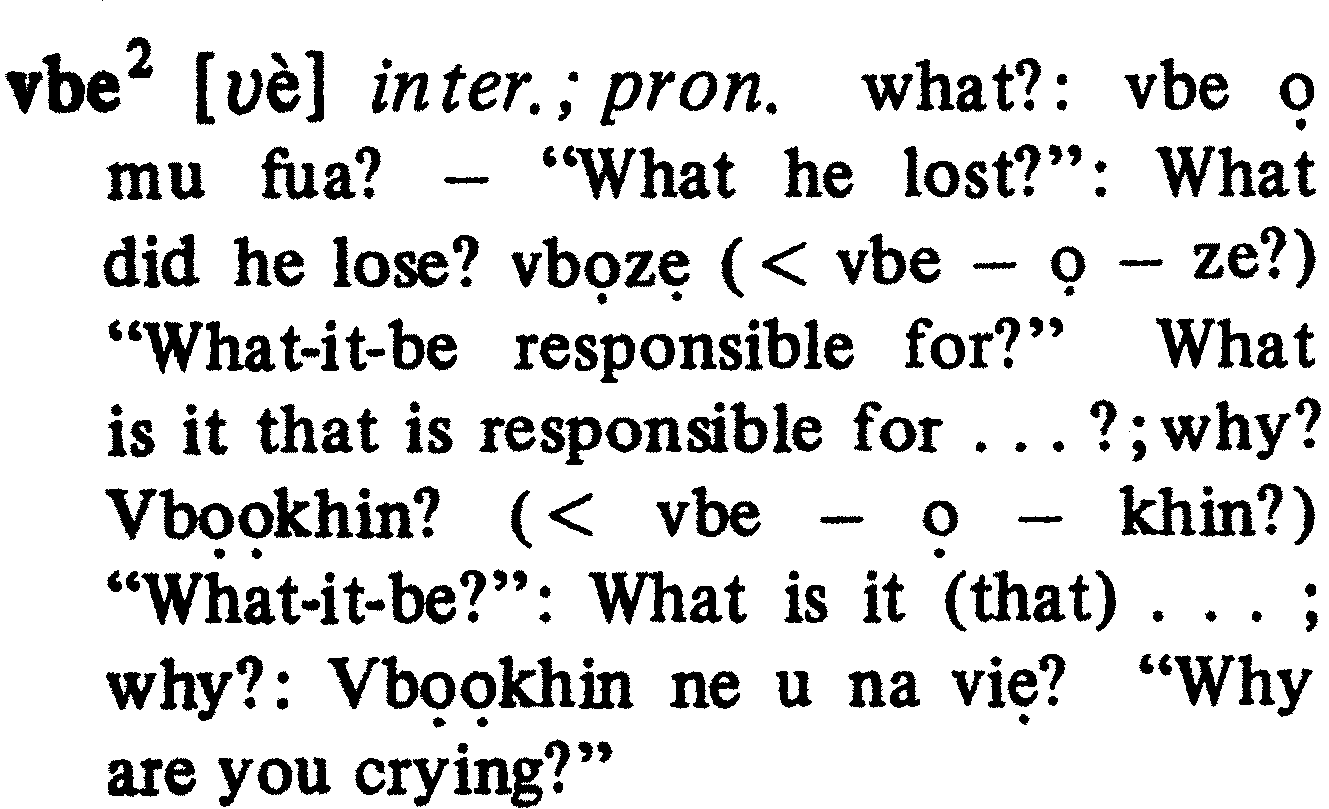
vbé1 [ʋé] prep.; conj. as, like (occurs
with only nouns and noun phrases
as its complement; clausal comple-
ments are introduced by vbene): Ọ
guan vbe erhae ― “He talks like his
father.” Ọ khian vbe ọmwan ne ẹi
mwẹn orhiọn ― “He walks like some-
body without strength.”
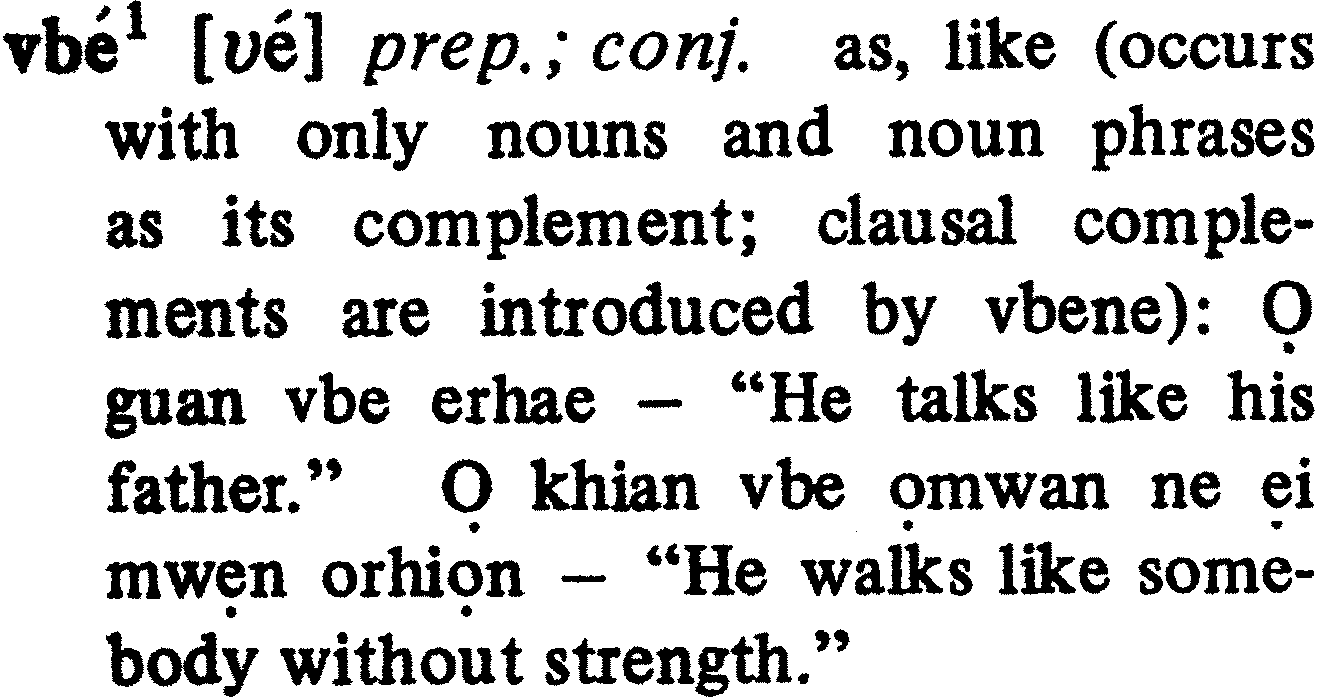
vbe2 [ʋé] conj. 1. and: Atiti vbe ọse
ọre ẹre ọ gba yo ẹzẹ ― “It was Atiti
and her friend that went to the stream
together” (cf. kevbe); 2. also; as
well: Ọ vbe wẹ erhae gha rre ― “He
also said that her father will come.”
(cf. kevbe).
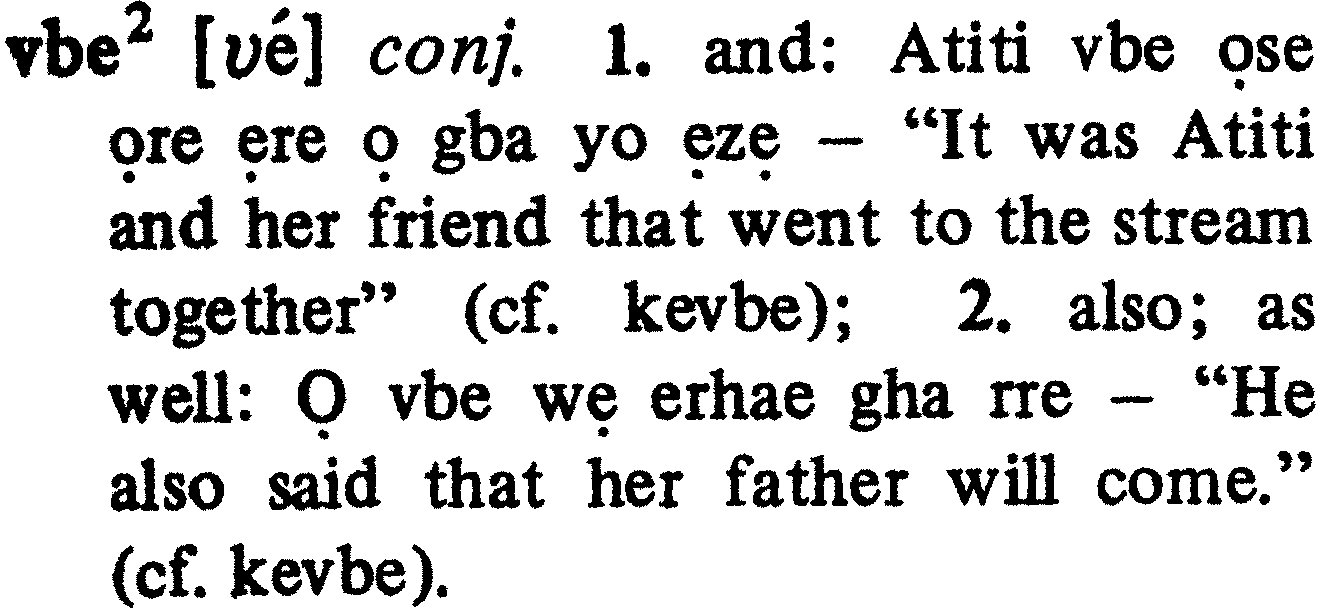
vbee [ʋèé] vb. to be scarce; in short
supply: Ígho vbee gbe vbe ẹghẹ na ―
“Money is very scarce at this time.”

vbekpa [ʋèkpá] adv. concerning (some-
thing; someone; etc.); in connection
with; about ― Ọ gu ẹre guan vbekpa
owa ne ọ bọ ― “He talked to him
concerning the house he is building.”

vbene [ʋénẽ̀] conj. cf. vbe1.

vbenia [vénỹ̀ã́] adv. (< vbe1 ― enia)
%%

this way; like this; thus: Ọ khaare
vbenia ― “He said like this: He said
thus.” (also vberian ― a form used
mainly by old people).

vberriọ [ʋéryɔ́] adv. (< vbe1 ― errio)
like that: Ọ ruẹe vberriọ ― “He did
it like that.”

vbẹe [ʋɛ́è] vb. to be wide, broad: Urro
na vbẹe ― “This wooden tray is
wide.”

vbẹ̀ẹ1 [ʋɛ̀ɛ́] vb. 1. to widen; expand:
Ọ fian ekherhe ya vbẹẹ ukpọn na ―
“She cut a little bit to widen this
cloth.”; 2. (idiomatic) (with aro
as subject): to be wide-eyed; to be
greedy: Aro vbẹẹ ọre gbe ― “Eyes
widen for her excessively: She is
very greedy.”
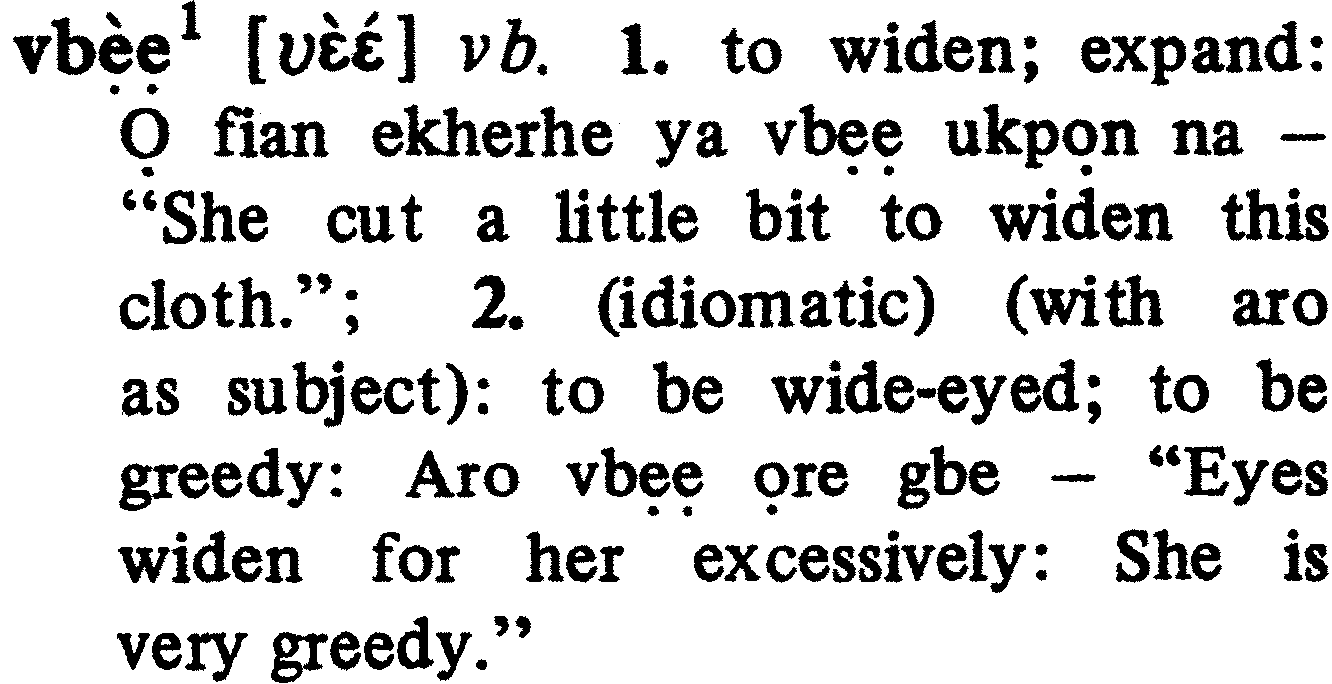
vbẹẹ2 [ʋɛ̀ɛ́] vb. to stoop: Ọ vbẹẹ la
onurho ― “He stooped to cross the
doorway.”

vbiẹ [ʋìɛ́] vb. to sleep: Ohuẹn ma gi
Ozo vbiẹ nasọn ― “Cough did not
let Ozo sleep last night.”

vbiẹrẹ [vyɛ̀ɽɛ́] vb. to be cowardly; to
lack courage: Ọ vbiẹrẹ gbe ― “She
is too cowardly.”

vbiẹvbiẹ [ʋiɛ̀ʋiɛ́] vb. 1. to heat up
(water): Ọ khian vbiẹvbiẹ amẹ nuẹ ―
“She is going to heat up some water
for you.”; 2. to be warm; (of water)
to be “not cool”, and therefore un-
pleasant to drink: Amẹ na wa vbiẹvbiẹ,
ẹi gi a wọn ― “This water is quite
warm; it is not suitable for drinking.”
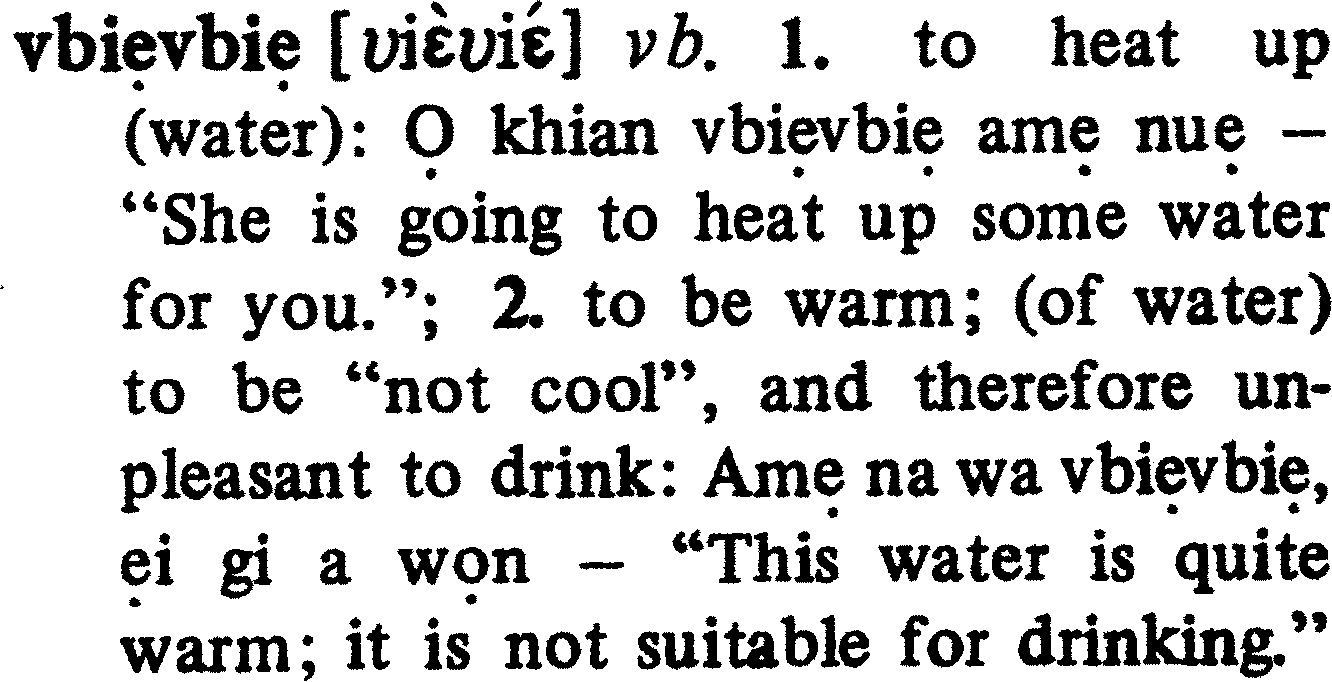
vbirrivbirri [ʋìrìʋìrì] adj.; adv. (usually
occurs with owiẹ): decribes early
dawn: Owiẹ vbirrivbirri ― “at the
crack of dawn.”

vbobọvbobọ [ʋòbɔ́ʋòbɔ́] adv. (< vbe
$Page 160$

― obọ ― vbe ― obọ) “at hand, at
hand”: right now; instantly: Ọ
sanmwẹn ọnrẹn rhie vbobọvbobọ ―
“He snatched it instantly.”

vbokho [ʋòxó] vb. 1. to bend; to
twist: Ọ vbokho ẹre obọ ghe iyeke ―
“He twisted her arm to the back.”;
2. to be flexible; be capable of bend-
ing: Erhan na i-vbokho ― “This piece
of stick is not flexible.”
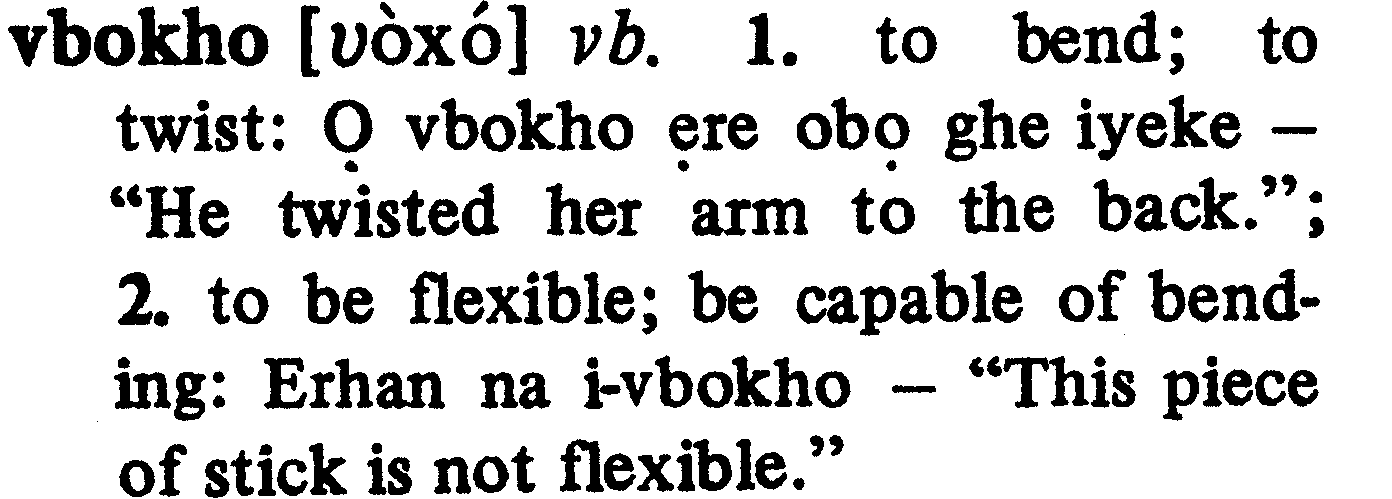
vboo1 [ʋòó] vb. 1. to ripen; to be
ripe: Ẹdin-ebo na vbooro nẹ ― “This
pineapple has ripened.”; 2. (of eyes)
to redden (with expectation): Aro
ọre vbooro ye odẹ ― “Her eyes have
reddened on the road: Her eyes are
fixed on the road (with expectation).”
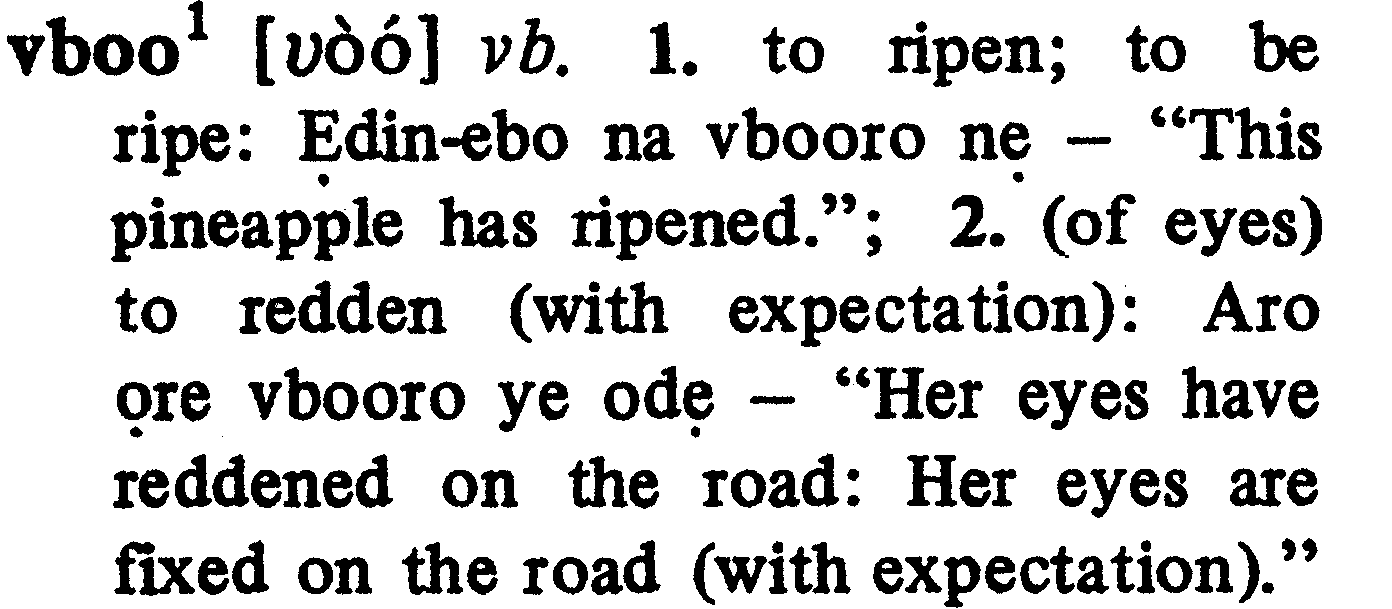
vboo2 [ʋòó] inter.; part. (occurs at
the end of the sentence): location
question particle: (to be) where? Owa
ruẹ vboo? ― “Where is your house?”

vbovbo [ʋòʋó] vb. 1. to carry (usually
a child) on the back: Ọ mu ọmọ
vbovbo ― “She backed a child”; 2.
to be carried on the back: Ọ wẹ irẹn
i vbovbo ― “He said he will not be
carried on the back.”
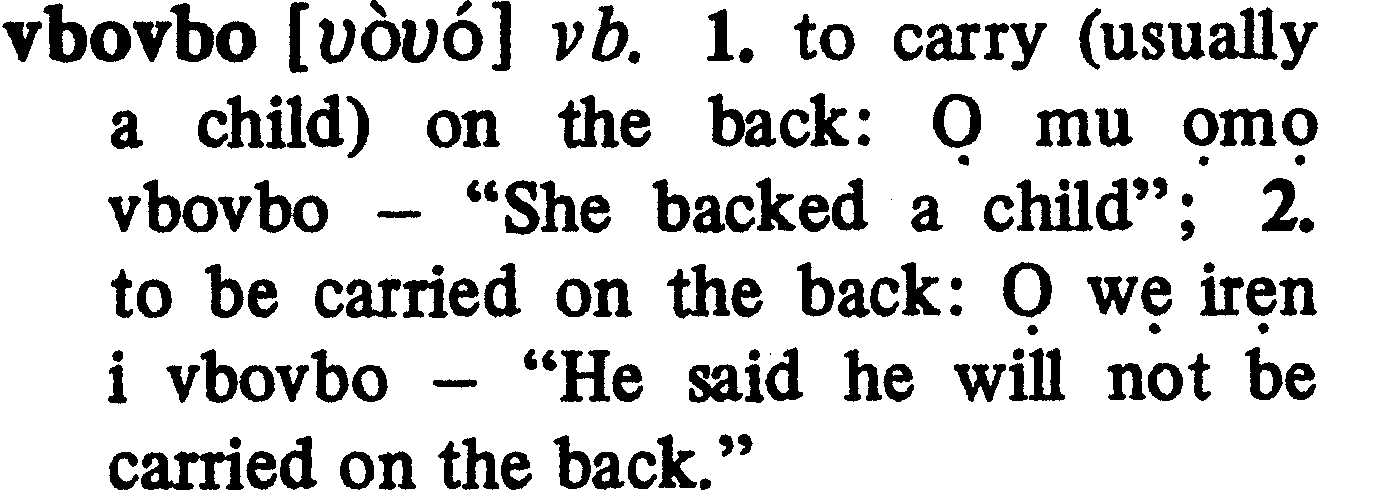
vbọ1 [ʋɔ́] vb. 1. to spring; to leap: Ọ
vbọe hin uhunmwun erhan ― “He
%%

leapt up on the tree”; 2. to pull out,
to extract: Iran vbọ mwẹn akọn vbe
asokito ― “They extracted my tooth
at the hospital.”

vbọ2 [ʋɔ́] adv. (compressed from vbe ―
vbọ) “from it”; “in it”: ọ ma miẹ
ọghẹe vbọ ― “He did not find his
own in it.”

vbọlọ [ʋɔ̀lɔ́] vb. 1. pl. and iter. sense
of vbọ: Iran vbọlọ akọn ― “They
had their teeth extracted.” Iran vbọlọ
kpaọ ― “They leapt away.”

vbu [ʋú] vb. to borrow: Ọ doo vbu
ukpọn vbe obọ mwẹn ― “He came
to borrow some cloth from me.”

vbuaro [vwáɽò] vb. to be stranded; to
be in a helpless state.

vbuovbuo [vwòvwó] vb. 1. to heat
(native pear) in hot ashes or hot water
to soften the pulp.; 2. to deteriorate;
to go bad. (of perishable foods, esp.
fruit, vegetable, and meat).

vbuyẹ [ʋùyɛ́] vb. to be lazy; weak.

vbuyẹvbuyẹ [ʋùyɛ̀ʋùyɛ̀] 1. adv. in-
dolently; weakly.; 2. adj. weak; lazy;
indolent.
